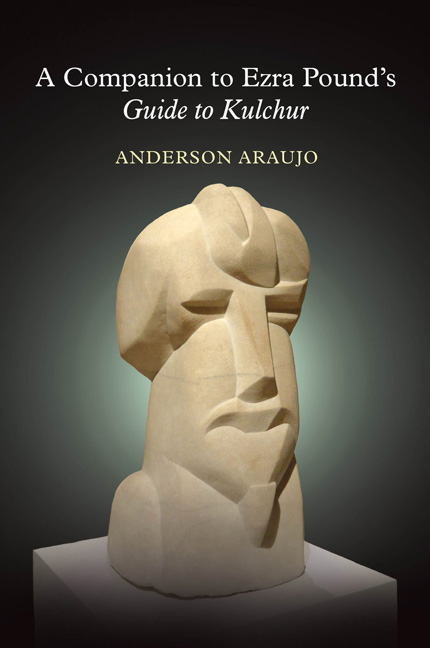Book contents
- Frontmatter
- Contents
- Acknowledgments
- Abbreviations
- Introduction
- Guide to Kulchur
- Part I
- Section I
- Section II
- Part II
- Section III
- Section IV
- Part III
- Section V
- Section VI
- Part IV
- Section VII
- 27 Maxims Of Prudence
- 28 Human Wishes
- Section VIII
- Section IV
- Part V
- Section X
- Section XI
- Part VI
- Section XII
- Section XIII
- Addenda: 1952
- Notes
- Index
28 - Human Wishes
from Section VII
- Frontmatter
- Contents
- Acknowledgments
- Abbreviations
- Introduction
- Guide to Kulchur
- Part I
- Section I
- Section II
- Part II
- Section III
- Section IV
- Part III
- Section V
- Section VI
- Part IV
- Section VII
- 27 Maxims Of Prudence
- 28 Human Wishes
- Section VIII
- Section IV
- Part V
- Section X
- Section XI
- Part VI
- Section XII
- Section XIII
- Addenda: 1952
- Notes
- Index
Summary
Dr Johnson's London … alteration”: Eliot wrote an introductory essay for the 1930 edition of Samuel Johnson's “London: A Poem” and “The Vanity of Human Wishes,” published in London by Frederic Etchells and Hugh Macdonald. In the quoted excerpt, Eliot praises the originality of both Johnson and the Irish poet Oliver Goldsmith (1730–74) for having “used the form of Pope beautifully, without ever being mere imitators.”
Anatole France's conscious process: French novelist, poet, and critic, Anatole France (1844–1924) was awarded the Nobel Prize for Literature in 1921. In La Revolte des anges (The Revolt of the Angels) (1914), France's fictional painter, Monsieur Gaetan, describes the technique of the French Romantic painter, Eugene Delacroix (1798–1863), in terms analogous to Pound's idea of France's own “conscious process”: “I saw Delacroix engaged on this work. Impassioned but anxious, he modelled feverishly, scraped out, re-painted unceasingly; his mighty hand made childish blunders, but the thing is done with the mastery of a genius and the inexperience of a schoolboy. It is a marvel how it holds.”
Arthur Symons … praised Whistler: Pound paraphrases Symons's Studies in Seven Arts (1906) (cf. note GK 71). In a chapter on the painter James Whistler (cf. note GK 110), Symons posits that in none of the artist's pursuits “does he try to follow a fine model or try to avoid following a model. He sees each thing in its own way, within its own limits.”
See nations slowly wise … everlasting debt: From Johnson's The Vanity of Human Wishes (1749).
Gautier's name: Theophile Gautier (1811–72), French poet, playwright, art critic, and one of the main exponents of the Aestheticist and proto-modernist doctrine of l'art pour l'art (“art for art's sake”), a manifesto for the autonomy of art and the inseparability of form and content in its production.
- Type
- Chapter
- Information
- A Companion to Ezra Pound's Guide to KulcherGuide to Kulcher, pp. 215 - 220Publisher: Liverpool University PressPrint publication year: 2018



